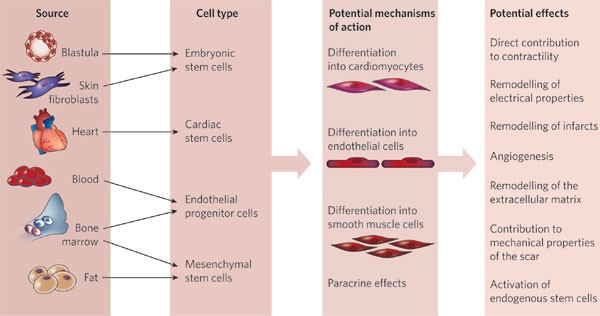Table of Contents

A 2014 meta-analysis of 23 randomized controlled tests involving 1,255 individuals revealed a lower risk of mortality or re-hospitalization in the lasting for clients who went through a stem cell therapy for heart illness. Regardless of some encouraging results, the diverse content and personality of these researches and the limited understanding of basic principles, pathways and various other aspects have reduced progression, particularly as it has to do with the one of one of the most intricate muscle mass in the body. In between 2010 and 2015, there have been about 41 medical trials performed using mesenchymal stem cells (MSCs) in heart repair work. A lot of these researches were in the handling of completing phase II and some were even moving right into phase III. Today, a growing number of clinical trials making use of stem cells like those found in cable tissue are being used to deal with cardiovascular disease.
Stem cell exosomes are a sophisticated treatment for heart health and wellness, supplying effective healing homes to damaged heart tissue. Unlike traditional stem cell therapies, these small blisters can improve heart repair service, decrease swelling, and improve heart feature, offering an encouraging new strategy to cardio care.
Stem cell exosomes advertise the growth of new blood vessels, a procedure called angiogenesis, which is necessary for delivering oxygen and nutrients to restoring heart cells. This boosted blood flow sustains the healing of harmed locations and strengthens the heart's general feature. Stem cell exosomes help minimize cell death (apoptosis) in the heart after injury, which is crucial for protecting heart function.
Inflammation typically leads to the advancement of heart disease, leading to further issues. Stem cell exosomes have anti-inflammatory residential or commercial properties that help decrease inflammation in heart tissue.
By reducing these pens, stem cell exosomes alleviate inflammation and reduce tissue damages. This reduction in inflammation can stop the development of cardiovascular problems. Stem cell exosomes control the immune system, preventing it from overreacting and creating additional swelling in heart cells. This inflection leads to a much more balanced immune feedback, decreasing the threat of persistent inflammation.
Does stem cell therapy support Heart Failure and what patients are saying
Stem cell exosomes have been revealed to improve left ventricular feature, which is usually endangered after a heart attack. Heart failing occurs when the heart can no longer pump blood successfully, which leads to a variety of health and wellness problems.
Stem cell exosomes help strengthen weakened heart cells, making it a lot more resistant to the effects of heart failing. They provide development aspects that improve the architectural integrity of the heart, avoiding additional damage.
They can examine your details heart problem and figure out if this therapy is an appropriate option for you. A specialist consultation makes certain that your heart health insurance stays secure and effective. Put in the time to study centers or therapy facilities that focus on stem cell exosome therapy. Look for carriers with a solid track document and favorable individual results in heart health treatments.
Discover what stem cell exosome therapy involves, including how the therapy is administered and what to expect during the process. This consists of understanding any kind of pre-treatment preparations and the common duration of therapy. Understanding the information will certainly assist you feel more comfortable and ready for the treatment. Review the prospective advantages and risks of stem cell exosome treatment with your medical care company.
Are there supportive options for Heart Disease with stem cells?
A complete review guarantees you make an educated decision regarding your heart health. Deal with your physician to create an individualized heart health insurance that includes stem cell exosome treatment. This strategy needs to describe the timing and regularity of treatments, in addition to any type of corresponding therapies that might boost your heart health.
This approach prevents the intricacies and prospective dangers of using real-time stem cells. Stem cell exosome treatment is normally considered risk-free, with very little side results reported.

Some clients might discover enhancements in heart feature within a few weeks, while others may take longer. BioRestore in Connecticut provides sophisticated stem cell exosome therapy to help improve your heart wellness and overall wellness. This ingenious therapy targets heart tissue, lowering swelling, advertising regeneration, and boosting recovery.
A number of kinds of stem cells have been explored for their potential in cardio therapy, including: These cells are stemmed from embryos and have the ability to differentiate into any type of cell kind. Their use is restricted due to ethical problems and the risk of teratoma development. These cells are produced from grown-up cells that are reprogrammed to have pluripotent capabilities comparable to ESCs.
MSCs are grown-up stem cells that can be isolated from numerous cells, including bone marrow, fat, and umbilical cord. They have actually been extensively utilized in cardiovascular therapy because of their ability to separate right into different cell types and their immunomodulatory homes. CSCs are a sort of grown-up stem cell that is resident in the heart.
Where to get stem cell therapy targeting Heart Disease

The immunogenicity of stem cells can bring about an immune reaction, decreasing their efficacy and potentially triggering damaging impacts. The large-scale production of high-grade stem cells continues to be a significant obstacle. To overcome the difficulties and limitations, future r & d in stem cell therapy ought to concentrate on: Developing strategies to boost the survival and engraftment of transplanted stem cells.
Navigation
Latest Posts
Can stem cells help with High Blood Pressure — what the science says
New hope for Heart Failure using stem cells
Where to get stem cell therapy for Heart Failure